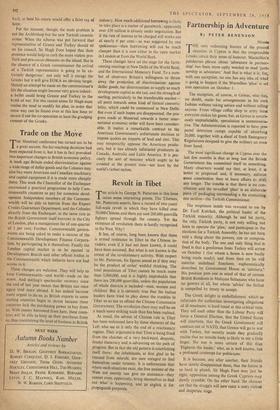Partnership in Adventure
By PETER BENENSON Nicos1 Pr HE only redeeming feature of the present 1 situation in Cyprus is that the irrepressible Greeks retain their sense of humour. Macmillan's ponderous phrase about 'adventure in partner- ship' has been more aptly worded to read 'part. nership in adventure.' And that is what it is; fort with one exception, no one has any idea of what is going to happen if the Macmillan 'plan' is set into operation on October 1.
The exception, of course, is Grivas, who has, no doubt, made his arrangements in his own fashion without taking advice and without telling anyone. From village coffee shop to army mesa everyone makes his guess, but, as Grivas is notori. ously unpredictable, speculation is unremunera. Live. The Administration is reported to have pre. pared detention camps capable of absorbing 20,000, together with a sheaf of fresh Emergency Regulations designed to give the military an even freer hand.
The most significant change in Cyprus over the last few months is that at long last the British Government has committed itself to something. Many observers would say that, at least, it is better to propound and, if necessary, enforce some constitution than to leave affairs to drift any longer. The trouble is that there is no con- stitution and the so-called 'plan' is an elaborate piece of packaging surrounding a tin containing one sardine—the Turkish Commissioner.
The emptiness inside was revealed to me by Dr. Fazil Kutchuk, the political leader of the Turkish minority. Although he and his party, the only Turkish party, is not only willing but keen to operate the 'plan,' and participate in the elections for a Turkish Assembly, he has not been told a thing about the powers, size or composi- tion of the body. The one and only thing that is fixed is that a gentleman from Turkey will arrive on October 1 (for whom a house is now busily being made ready), and from then on he will exercise undefined functions, euphemistically described by Government House as 'advisory.' His position puts one in mind of that of certain British Residents in Malayan Sultanates who have no powers at all, but whose 'advice' the Sultan is compelled by treaty to accept.
The Greek delight in embellishment, which so infuriates the authorities investigating allegations of ill-treatment, is hard taxed at this critical time. They tell each other than the Labour Party will force a General Election, that the United States will intervene, that the Greek Government will contract out of NATO, that Greece will go to war with Turkey, but secretly inside they gradually realise that no outside body is likely to stir a little finger. No one is more certain of this than 'Dighenis the leader,' who, as is well known, has a profound contempt for politicians.
It is because, one after another, their friends have slowly disappointed them, that the future is so hard to plumb. Sir Hugh Foot may just be right; opposition among the Greek Cypriots may slowly crumble. On the other hand, the chances are that the struggle will now enter a more violent and desperate stage. With the Greek Government getting a press almost as bad as the Britisli;antlkith the Labour Party's Party's elebtoral prospects sagging, erstwhile friends have declining influence With. the Greek Cypriots. Counsels of moderation are politely received, but are unlikely to be accepted. A few months ago the logic of their situation was to sit back and wait for a Labour Government; today it is to let all hell loose in a desperate attempt to get the Government to delay the 'plan.'
The risk of indiscriminate killing is sufficiently great to make it a wise precaution to start evacu- ating British families. The cost of flying them out is little compared with the irreparable tragedy of wounding or death. The Cabinet will bear a heavy personal responsibility if it fails to take the deci- sion until after a woman or child has been hurt.
The presence of families here adds to the ten- sion and to the ingrowing, subconscious fear which is gradually eroding most Britons. No man can remain entirely rational in his approach when he has to find someone to hold his revolver for him on the .beacti When he wants to swim. It is thirteen years since the war, and few British troops have had any battle seasoning; it is scarcely surprising that they are edgy and tend to release some of their. pent-up tension when searching Greek villages. It is not that they are any less courageous than their forebears, but that a Government, which has manoeuvred itself into what is virtually an open war, is failing to impose war-time conditions. • The reason for the Government's anxiety to avoid putting the Security Forces on a war-time footing is presumably that it wants to disguise from people back home just how serious the situ- ation is. But the figures for the loss of British life speak for themselves. if the Government is deter- mined to impose a 'plan' that is totally rejected by four-fifths of the islanders, it should at least warn the British public what the cost may be in terms of British lives—and world respect.



































 Previous page
Previous page